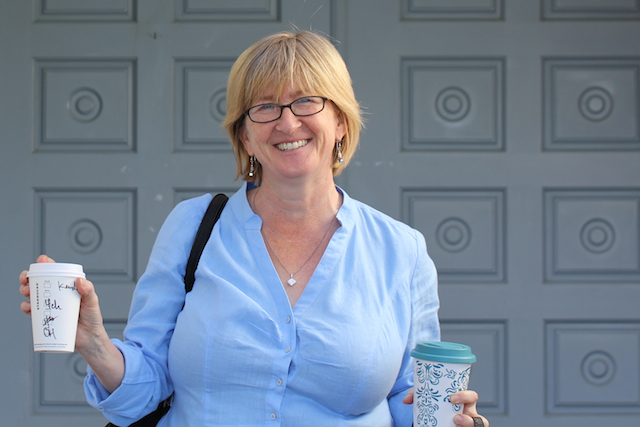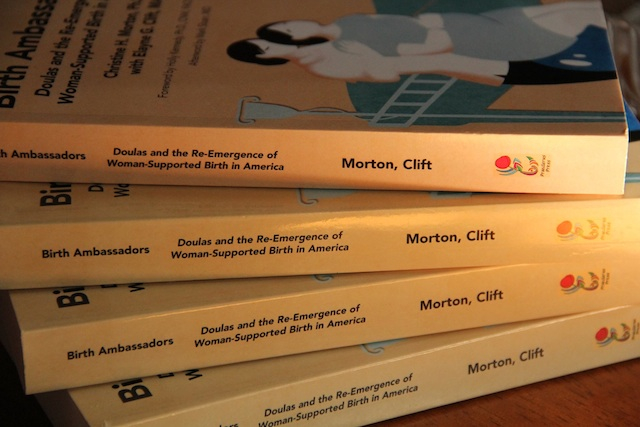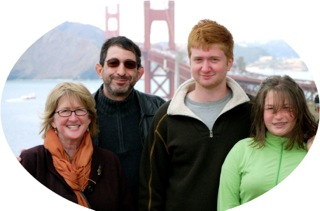Studying Doulas: Author, Christine Morton, PhD
I started the “Who BEcomes A Doula?” Series because I wanted know more about what compels a woman (or a man) to become a birth doula? Are we all just “birth junkies”? (I deeply dislike that term).
I wanted to know:
~Who is drawn to this work and what kind of work (or life) did they have before they became a birth doula?
~What makes them continue?
~Is there something about our personalities that leads us to find a way to connect with, care for and support women at that uniquely vulnerable and joyous time of birth?
~Does it matter what part of the country, or the world we live in or is it in our human DNA to do this work regardless of country and culture?
~And for fun, some questions and photos that give us a glimpse into the moments and meanings in their lives.
For this project, I have chosen to interview doulas all over the world.
Some are new to this work. Some are seasoned and ‘reasoned’ – my way of saying they have found what it takes to make this work sustainable – both professionally and personally.
All of them inspire me in my own “heart’s work”, like….
Christine Morton, PhD
I have vague memories of Christine Morton sitting on my couch in our house in Bellevue, Washington and asking me questions about ultrasounds during my first pregnancy in1997. This may be a story I am making up in my head, but it is there nevertheless. I knew she was working on something. The next thing I knew she was studying doulas.
I have more vivid memories of taking my sons to her house in Redmond Washington in the middle of the night because I was on my way to a birth and my husband was out of town. Her generous support allowed me to continue my work when my husband changed jobs and could no longer stay home if I was called to a birth. Christine supported me so I could support my clients. She told me once: “I can’t be a doula now, so I support motherbabies by helping you go and support them.”
And I have very vivid memories of sitting at her kitchen table talking over cups of warm tea and some delicious bread or muffin she had just pulled out of the oven. She not only looked after my children, she always wanted to hear about the births and know how it was from the point of view of everyone in the birthing room. It was clearly the sociologist in her that wanted to understand everyone’s perspective and the dynamic of the group of individuals who all came together to support and care for the birthing woman.
But it was the role of the doula that intrigued Christine most. So much so she wrote not only her dissertation, but a book about doulas as well.
What inspired you to write Birth Ambassadors?
I wanted a PhD! But doing the research and writing the dissertation wasn’t enough – from the beginning I wanted the research on the history and experience of doula care to be published as an accessible book that would fairly represent dilemmas in providing doula care and honor those who were doing the work. I also hoped it would be helpful for new and aspiring doulas to realize that doula care is skilled work, and that there is nothing ‘natural’ about it. I wanted to share my insights about the challenges facing doulas and contribute to ongoing conversations about these challenges with doulas & their organizations.
Was there anything about doulas or the profession that surprised you as you were researching the book?
I was surprised to discover that many doulas have undergraduate degrees in anthropology or sociology! I was also impressed to see how many doulas were actively reading the research literature about pregnancy and birth in many subject areas – obstetrics, nursing, breastfeeding, psychology and of course, anthropology and sociology.
You now work at the California Maternal Quality Care Collaborative. Would you share a bit about your work there?
My primary role at CMQCC has been to serve as project manager of the first statewide review of maternal death in California, and analyze the improvement opportunities identified by the Committee. This year, the project will end in its current form, after reviewing over 400 cases of maternal death from 2002-2007, ~300 of which were determined to be pregnancy-related. When I started, I didn’t know much about maternal mortality and morbidity but now I belong to this unique club – a participant in a state maternal mortality review – and have gained a lot of expertise in this area. It’s been an incredible learning opportunity and one that forced me to confront some of my assumptions about why maternal death occurs and what can be done to improve outcomes.
We identify a lot of systems- and health care provider- level issues that require a coordinated and targeted approach, like more education and skills-based training about these rare complications for maternity clinicians, and improved systems of care for pregnant women at high risk of poor outcomes. And the power of vital signs! It seems so simple and yet high blood pressure or high heart rate is nothing to ignore or deny. It seems all clinicians, whether OB, nurse or midwife, can downplay a high blood pressure reading or elevated heart rate and not recognize the subtle changes from normal to abnormal in pregnant women and so not respond to them appropriately. We see this “denial and delay” in preventable deaths from hemorrhage and preeclampsia, and it’s the primary focus of the Toolkits CMQCC has produced on these topics.
I am also conducting research about women’s experiences with a severe complication during pregnancy/childbirth. For many of them, there is little social support for women as they recover after a near-death experience. It’s astonishing how they are discharged home and left to figure things out and recover – physically and emotionally – alone. The findings from these analyses are informing current and future Toolkits on maternity care topics, so that clinicians learn not just the technical skills to manage a severe event like hemorrhage, but also the emotional needs of women and their families during and after these events.
CMQCC is housed at Stanford University where there is no shortage of brilliant, driven people doing amazing things. Being in this environment is intimidating and inspiring. My colleagues have taught me so much about how to think big and execute on a vision. It takes persistent and engaging leadership and strong organizational frameworks. I have seen how thoughtful strategic planning, sufficient funding and coordinated, collaborative action on the part of many talented and passionate individuals can change systems of care, and we hope, the culture of maternity care. I’ve got the best job in the world for me, I think!
What role do you see doulas playing in ending preventable morbidity and mortality in childbirth?
I have thought about this quite a bit, especially since I finished writing Birth Ambassadors after having worked at CMQCC for a few years. Doulas attend few births relative to the entire population, and because severe maternal events are rare, doulas may have just a few clients in their career who experience severe preeclampsia/eclampsia, have a massive hemorrhage requiring multiple blood transfusions or develop a blood clot (venous thromboembolism). Doulas can be very helpful in talking to women about warning signs of these more common complications (and I think doulas should know about them), and encourage women to seek care when these warning signs arise. In so many of the cases I’ve seen (whether maternal death or women’s stories of severe events), the symptoms are either discounted or ignored – by women, their families or their health care providers. Women need to know headaches unrelieved by treatment are not normal! Women need to know what level of postpartum blood flow is not normal! Women who experience pain in their legs after a long induction and /or bedrest and c-section need to be checked out! And women need advocates at their side if they do seek care but are not taken seriously by health care providers. Doulas are very good at listening to women, and believing them. Doulas can accompany women to the clinic and can act as patient advocates during labor.
Alright…now for a little light-heartedness:
What is your favorite word? Serendipity
What is your least favorite word? Hemorrhoids
What sound or noise do you love? The sound of coffee beans being ground in the morning
What sound or noise do you hate? The alarm clock
What movie could you watch again and again? It’s a Wonderful Life
What book are you reading now? Fiction: All I know and love by Judith Frank; Nonfiction: What I learned in medical school: personal stories of young doctors by Kevin M. Takakuwa and Nick Rubashkin
When driving in the car or riding in a plane what do you listen to? Books on tape
The food you would eat several times a week if you could is… Blueberries
Your favorite pair of shoes are…My sheepskin lined boots
Favorite APP? Evernote
Your family would say about you… I’m the “curb queen” who likes to talk about pregnancy and childbirth
When you are not a birth, where are we mostly to find you? At my computer
Why/How did you become a doula? On my way to a research project
Why do you continue? I have not continued active doula practice since 2006
If you could say only one thing at a birth to the laboring woman, what would it be? Beautiful
What is the most challenging thing about being a doula? When I was a doula, the most challenging part was waiting for the call
What is the most rewarding part of being a doula for you? When I was a doula, it was feeling I had been useful to the woman and her support team
We all understand the need women have to feel safe during childbirth and the value of a mother’s willingness to be vulnerable in her birthing time. We all feel vulnerable at some time.
Vulnerability is … Admitting you don’t have all the answers
How have you experienced the value of allowing yourself to be vulnerable as a doula? By letting go of my desire to fix things
Sometimes the “story I make up in my mind is”… I’m living in a little house by the sea and writing books and walking on the shore with my dogs and having fun with my family and friends (who all live nearby)
Courage is… feeling the fear and doing it anyway.
How do you summon it? Deep breaths and reminding myself that nobody’s perfect
Authenticity is…being present in the moment and being fully there with someone
To recharge your BEing, you… walk my dogs or take a walk in a nature
What question matters most to you? How can I be my best self?
Anything else do you want/are you willing for us to know? I often feel lonely on Facebook because I miss my friends who I can’t see in person very much
Your advice to new doulas – in HAIKU please (5-7-5 syllables)
You are the one who
Will soak up pain fear and joy
Emotional sponge



